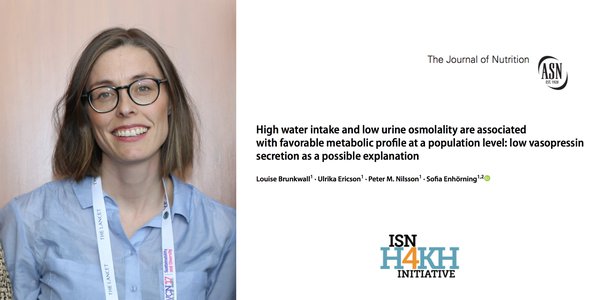Brunkwall L. et al. 2020
High water intake and low urine osmolality are associated with favorable metabolic profile at a population level: low vasopressin secretion as a possible explanation
Purpose
Elevated plasma concentration of the vasopressin marker copeptin and low water intake are associated with elevated blood glucose and diabetes risk at a population level. Moreover, in individuals with low urine volume and high urine osmolality (u-Osm), water supplementation reduced fasting plasma (fp) copeptin and fp-glucose. In this observational study, we investigated if low total water intake or high u-Osm correlated with high fp-copeptin and components of the metabolic syndrome at the population level.
Methods
In the population-based Malmö Offspring Study (MOS, n = 2599), fp-copeptin and u-Osm from morning urine samples were measured, and diet and total water intake (from beverages and food moisture) was assessed by a 4-day web-based record.
Results
Increasing water intake by tertile was after adjustment for age and sex associated with low fp-triglycerides (p = 0.002) and high fp-HDL (p = 0.004), whereas there was no association with the other investigated metabolic traits (HbA1c, fp-glucose, BMI or waist circumference). Increasing u-Osm by tertile was, after adjustment for age and sex, associated with high fp-glucose (p = 0.007), and borderline significantly associated with high HbA1c (p = 0.053), but no association was observed with fp-HDL, fp-triglycerides, BMI or waist circumference. Fp-copeptin concentration correlated significantly with water intake (r = − 0.13, p < 0.001) and u-Osm (r = 0.27, p < 0.001). High copeptin was associated with all investigated metabolic traits (p < 0.001 for all).
Conclusion
Low concentrations of the vasopressin marker copeptin is linked to high water intake, low u-Osm, and a favorable metabolic profile, suggesting that vasopressin lowering lifestyle interventions, such as increased water intake, may promote metabolic health.
This research was done in the frame of the Hydration for Kidney Health Initiative, an initiative between Hydration for Health and The International Society of Nephrology.
More information about the publication: https://www.theisn.org/news/item/3510-isn-h4kh-grant-awardee-publishes-research-findings
